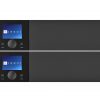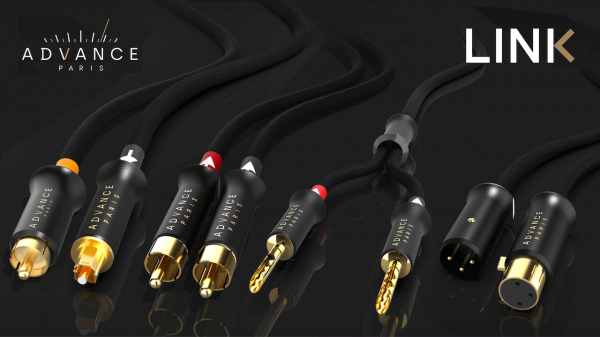An Interview with Gene DellaSala from Audioholics.com on Audio Cables
Can cables make an audible difference?
Most definitely, but usually not for the reasons that many exotic cable vendors would have you believe. And the “difference” may or may not be a good thing. We refer to companies that produce high glossy cables constructed of elaborate metals and/or wrappings supported by fancy marketing to justify high prices as Exotic Cable vendors. We have seen many exotic speaker cables that actually acted like a tone control rolling off high frequency response due to excessive resistance and inductance, while we have seen other cables make a system sound bright because of their excessive capacitance causing the amplifier to peak its high frequency response. Be cautious about exotic cable vendors that do not specify cable metrics or downplay the importance of measurements.
What is the purpose of an audio cable?
That’s a good question and certainly often a misunderstood one due to the bombardment of misinformation in the audio industry. The basic purpose of a cable is to transfer the signal from point A to point B unadulterated. At audio frequencies the goal is to minimize losses by controlling the amount of Resistance, Inductance and Capacitance. For speaker cables, we have found the primary concerns for optimal signal transfer is to minimize resistance, followed by inductance, while also keeping capacitance in check to eliminate the possibilities of amplifier oscillation or frequency peaking. For line level analog interconnects it’s a good idea to use cables that are low in capacitance and are well shielded to eliminate interference and external noise sources from mitigating into the signal. For video, good shielding and maintaining the proper characteristic impedance is vital. For more details on cable basics, I encourage your readership to review our Cable Budget Guidelines article.
Should I buy expensive cables?
Provided that the cables are properly designed and meet your specific requirements I see no reason why you shouldn’t invest in quality, not necessarily expensive cables. However, many of the lavishly priced exotic cables are not designed well and more often the case than not, cheaper cables, which are usually not covered in bogus marketing literature, offer better performance and certainly better value.
How much should I invest in cables?
We generally recommend about 5-7% of total system cost. Anything more would be better spent on higher performance electronics, speakers, room treatments or software.
Why do some cables cost so much?
In my opinion, there are several reasons actually.
- In HiFi, if a product doesn’t carry a very high price, it won’t be taken seriously by many audiophiles.
- Many of the exotics are niche products that sell in low quantities to a limited market, thus in order to be profitable must carry a high price tag to pay for company overhead and marketing expenses.
- Some of the exotic cables do involve higher material costs. While this may not improve the electrical or audible characteristics of the cables, it does usually improve their cosmetics and product appeal.
Who really makes cables, and who just puts their logo on them?
Very few cable vendors, especially the exotic brands, manufacturer their own cables. Most of them buy large reels of wire from China and either repackage them locally or have them labeled with their Logo overseas. In fact we usually receive 2-3 emails/week from overseas vendors wanting to manufacturer and brand Audioholics.com cables for us. What do you think, good idea?
Why is there so much confusion about cables?
I suspect misinformation and low consumer awareness are the key reasons. Of course glowing subjective reviews and endorsements in audio publications don’t help this either. Many exotic cable vendors know the average consumer/audiophile has little or no background in electronics, yet they somehow have to justify why their products cost so much and why the consumer/audiophile needs them. So with that, the exotic cable vendor concocts marketing literature, usually in the form of a story, based on half engineering truths or misapplied engineering principles to lure you in. They often reject the proven fundamental truths that govern these principles and claim established associated theories cannot be verified through measurements or engineering certainties, but instead only through hearing. What they fail to provide however is repeatable statistical data and correlation that their cables do sound “better” for the reasons they tout. They often go one step further and claim it can take weeks for the consumer to hear the benefits of their cables since they require a break in period. In reality cable break in is another misnomer, which I suspect is used to convince the customer to keep the cables beyond the retailers return policy. In addition, statistically, the longer the customer keeps a product the less likely they are to return it.
Are there any industry cable standards?
Unfortunately no. Organizations such as the FTC do not regulate cable vendor claims and most cable vendors are slick with their claims by how they phrase them by using terms like (can, may, in our opinion, etc). Their claim about solving a problem that really doesn’t exist is mostly nebulous. For example, if the vendor claims their cables resolve “Strand Jumping” ten times better than ordinary 12AWG Zip Cord, then since this problem really doesn’t exist, ten times zero is still zero.
Rest assured that Audioholics.com will always serve the consumers as the voice of reasons about cables and will question illegitimate claims made by any cable vendor when they surface on our radar screens. We are working to establish standards for the audio industry on cables as you will soon see in up and coming articles.
Why aren’t hardware vendors who design the electronics more vocal about cables?
This is a rather complicated subject that I will try to answer as eloquently as possible without offending anyone. Many of the reputable hardware vendors I have spoken with feel exactly as I do about cables, at least privately. I suspect they aren’t publicly vocal about it because they don’t want to undercut their dealerships. Believe it or not, most dealer’s bread and butter result from cable sales. Cables offer some of the highest profit margins in the industry. It is not uncommon for a dealer to do in excess of $100K/month in revenues for cable sales where they would be lucky to do 1/4th of that in sales and maybe 1/8th in profit margins of say loudspeakers.
What marketing jargon do I need to be aware of?
Here is a list of the top ten marketing gimmicks that we noticed many of the exotic cable vendors enjoy promoting: https://www.audioholics.com/audio-video-cables/top-ten-signs-an-audio-cable-vendor-is-selling-you-snake-oil
About Gene DellaSala
Gene DellaSala (GDS), founder of Audioholics.com, has been an audio enthusiast since childhood. His passion for audio increased with age, which lead him to study Electrical Engineering where he earned a B.S.E.E. from the University of South Florida and pursued a career as an Analog Engineer. Gene currently works in the telecommunications industry designing audio communications equipment for a national defense company. Gene pursued his audio career as a hobby, but has had major impacts on the audio industry since Audioholics.com’s inception. He and his staff have developed one of the top ranked audio information websites on the internet which continues to expand on a daily basis due to increased membership and direct interaction with many of the leading audio manufacturers in the world.
Also, see our archived forum thread about this article. Or continue the debate below.








































Methadras
November 20, 2013 at 12:19 am
Audiophiles are idiots.